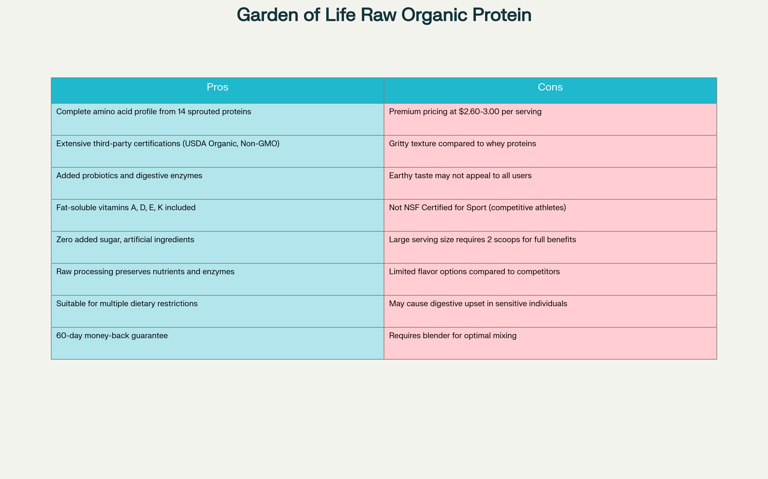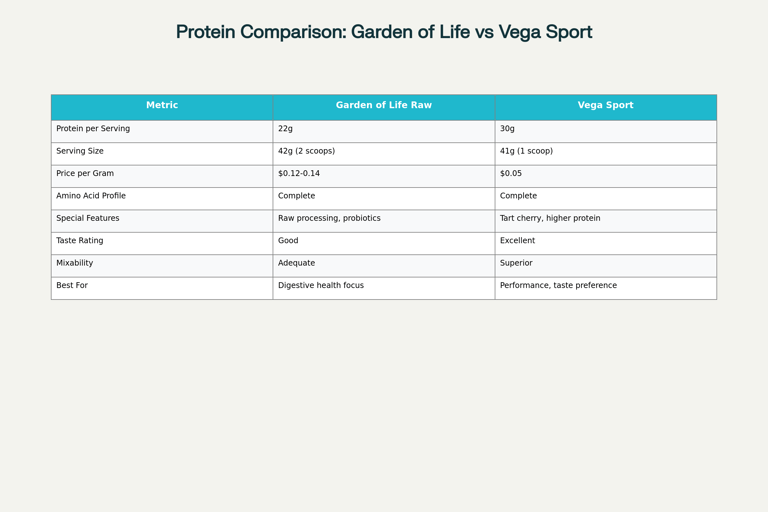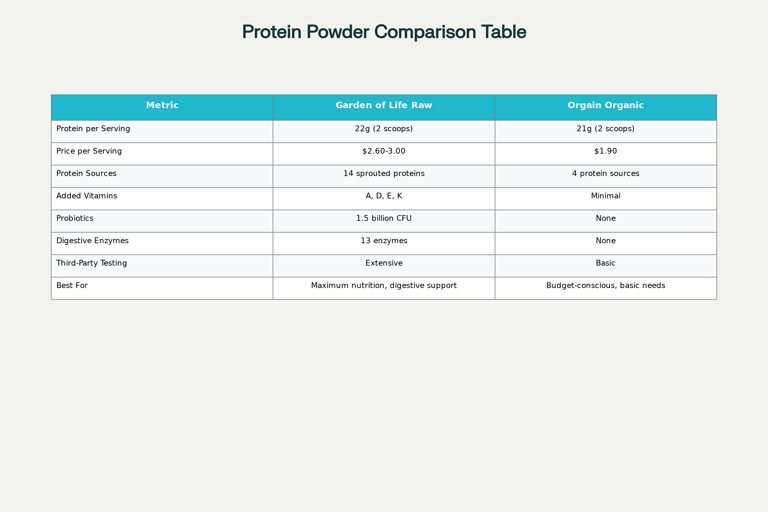"Garden of Life Raw Organic Protein Review: Worth $2.05 Per Serving? "
"Garden of Life Raw Organic Protein review: Is $2.05 per serving worth it for 22g sprouted protein? See taste test vs Orgain ($1.30), probiotics benefits + recipes inside."
PRODUCT REVIEW
Garden of Life Raw Organic Protein stands as one of the most popular plant-based protein powders in the organic supplement market, offering 22 grams of complete protein from 14 raw sprouted ingredients. With extensive third-party certifications and digestive support features, this premium protein blend promises superior bioavailability compared to conventional protein powders. But does its high price point align with its nutritional benefits? Our comprehensive analysis examines taste, mixability, ingredient quality, and value against top competitors to help you make an informed decision.
Product information
Garden of Life Raw Organic Protein is available in multiple variants, with the Vanilla flavor being among the most popular options alongside Unflavored and Chocolate varieties. Each container provides approximately 20 servings, with a recommended serving size of 1-2 scoops (42g total) mixed with 8-16 ounces of water or plant milk.
Available Variants:
Unflavored Raw (stevia-free, most versatile)
Vanilla (naturally sweetened with stevia)
Chocolate (rich cocoa flavor)
Strawberry (limited availability in select locations)
Raw Organic Fit (specialized for weight management with 28g protein)
The protein powder uses a distinctive "raw" processing method, never heated above 115°F to preserve natural enzymes, probiotics, and cofactors.
Complete Supplement Facts
Per 2-Scoop Serving (42g):
Calories: 110-140 (varies by flavor)
Protein: 22g (complete amino acid profile)
Total Fat: 2.5g (4% DV)
Total Carbohydrates: 2g (1% DV)
Dietary Fiber: 1g (4% DV)
Sugars: 0g (no added sugar)
Sodium: 180mg (8% DV)
Potassium: 50mg (1% DV)
Vitamin and Mineral Content:
Vitamin A: 4% DV
Vitamin D: 130% DV
Vitamin E: 15% DV
Vitamin K: 15% DV
Calcium: 10% DV
Iron: 20% DV
Magnesium: 8% DV
Zinc: 20% DV
Selenium: 65% DV
Manganese: 40% DV
Molybdenum: 130% DV
Comprehensive Ingredient Analysis
Raw Organic Protein Blend (Primary Source):
The protein matrix combines 14 raw sprouted proteins to create a complete amino acid profile:
Primary Proteins:
Organic Pea Protein: High in branched-chain amino acids, easily digestible
Organic Sprouted Brown Rice Protein: Hypoallergenic, provides methionine
Organic Amaranth Sprout: Ancient grain protein with lysine
Organic Buckwheat Sprout: Complete protein source
Organic Quinoa Sprout: All nine essential amino acids
Secondary Protein Sources:
Organic Millet, Chia Seed, Garbanzo Bean, Lentil, Adzuki Bean, Flax Seed, Sunflower Seed, Pumpkin Seed, and Sesame Seed sprouts
Sprouting Advantage:
The sprouting process increases bioavailability by breaking down antinutrients like phytic acid and enzyme inhibitors. This pre-digestion makes proteins more accessible to the body and reduces potential digestive discomfort.
Fat-Soluble Vitamins:
Unlike many plant proteins, Garden of Life includes naturally occurring vitamins A, D, E, and K, which support immune function, bone health, and antioxidant protection.
Digestive Support Complex:
Live Probiotics (1.5 billion CFU):
Lactobacillus acidophilus
Lactobacillus plantarum
Lactobacillus bulgaricus
Digestive Enzymes:
Lipase, Protease, Cellulase, Bromelain, Papain, and others to enhance protein breakdown and absorption.
Flavor Components (Vanilla variant):
Organic Erythritol (natural sweetener)
Organic Vanilla Flavors
Organic Stevia Extract
Sea Salt
Organic Guar Gum (texture enhancer)
Organic Carob Bean Gum
Evidence for Claimed Benefits
Complete Protein Quality
Garden of Life's 14-protein blend addresses the primary limitation of single plant proteins by providing all nine essential amino acids. Research confirms that combining complementary plant proteins (like pea and rice) creates amino acid profiles comparable to animal proteins.
BCAA Content: Each serving provides 4g of branched-chain amino acids (leucine, isoleucine, valine), crucial for muscle protein synthesis and recovery.
Enhanced Digestibility Through Probiotics
Recent studies demonstrate that specific probiotic strains can increase plant protein digestibility by 13-33%. The L. acidophilus and L. plantarum strains in Garden of Life align with research showing improved protein hydrolysis and amino acid bioavailability.
A 2020 clinical trial found that L. paracasei supplementation increased total essential amino acid absorption by 16% and BCAA absorption by 22.8% when consumed with plant protein.
Sprouted Protein Benefits
Sprouting increases protein digestibility by reducing antinutrients and activating beneficial enzymes. Studies show sprouted proteins have 15-25% higher bioavailability compared to non-sprouted alternatives.
Raw Processing Preservation
Heat processing above 115°F can denature proteins and destroy heat-sensitive vitamins. Garden of Life's low-temperature processing preserves protein structure and maintains enzyme activity, potentially improving nutrient utilization.
Taste and Mixability Assessment
Flavor Profile Analysis:
Vanilla Variant: Delivers a naturally sweet, creamy taste with subtle earthy undertones characteristic of plant proteins. The stevia-based sweetening system provides sweetness without artificial aftertaste.
Texture Concerns: Multiple reviewers note a slightly gritty texture compared to whey proteins. The improved formulation has reduced this issue, but some grittiness remains typical for plant-based proteins.
Mixability Performance:
Water Mixing: Dissolves adequately with vigorous shaking; some settling occurs over time
Milk/Plant Milk: Blends more smoothly with creamier liquids
Blender Recommended: Achieves best consistency when blended with frozen fruit
User Feedback: Reviews are polarized - those accustomed to plant proteins generally rate taste favorably, while whey protein users often find the flavor and texture less appealing.
Dosing and Timing Recommendations
Standard Dosing Protocol:
Daily Maintenance: 1 scoop (21g) mixed with 8-12oz liquid
Muscle Building: 2 scoops (42g) providing 22g complete protein
Post-Workout: Consume within 30-60 minutes after exercise for optimal muscle protein synthesis
Optimal Timing Strategies:
Morning: Supports protein synthesis after overnight fasting
Pre-Workout: 1 scoop 30-60 minutes before exercise (if tolerated)
Post-Workout: 1-2 scoops immediately after training
Between Meals: Helps maintain protein intake throughout the day
Special Population Considerations:
Vegans/Vegetarians: 1-2 servings daily to meet amino acid requirements
Athletes: Up to 3 servings daily, timed around training sessions
Seniors: 1-2 scoops daily to combat age-related muscle loss
Weight Management: Replace one meal with protein smoothie
Third-Party Certifications and Quality Assurance
Comprehensive Certification Portfolio:
USDA Certified Organic: Ensures no synthetic pesticides, herbicides, or GMOs in production
Non-GMO Project Verified: Third-party verification of genetic modification absence
NSF Contents Certified: Verifies label accuracy and ingredient purity
Certified Vegan: No animal products or byproducts
NSF Certified Gluten-Free: Safe for celiac disease patients
Certified Kosher: Meets Jewish dietary law requirements
Quality Control Measures:
Garden of Life implements extensive third-party testing throughout production:
Raw material screening for heavy metals and contaminants
Microbiological testing for pathogens
Finished product verification
Chain of custody documentation
Limitation: While heavily certified, Garden of Life Raw Organic Protein is not NSF Certified for Sport, unlike their Sport variant, making it unsuitable for competitive athletes subject to banned substance testing.
Allergen and Clean-Label Notes
Allergen-Free Profile:
Free From:
Dairy/Lactose
Soy
Gluten
Eggs
Tree Nuts
Peanuts
Shellfish
Artificial Colors, Flavors, Sweeteners, or Preservatives
Clean Label Advantages:
No fillers, binders, or synthetic additives
Whole food-based nutrition
Minimal ingredient list
Traceable organic ingredients
Potential Sensitivities:
Stevia sensitivity (flavored versions only)
High fiber content may cause digestive upset in sensitive individuals
Legume proteins could trigger reactions in those with severe legume allergies
Pricing and Value Analysis
Current Market Pricing:
20-serving container: $45-60 (average $52)
Cost per serving: $2.60-3.00
Cost per gram protein: $0.12-0.14
Subscription savings: 15-20% discount available
Value Comparison Context:
Garden of Life sits in the premium tier of plant proteins, with per-serving costs 40-60% higher than basic alternatives like Orgain ($1.90/serving) but comparable to other organic, sprouted options.
Availability:
Direct from manufacturer (best pricing)
Amazon (convenient, variable pricing)
Health food stores (Whole Foods, iHerb)
Costco (occasional availability)
Comprehensive Pros and Cons Analysis
Garden of Life vs. Orgain and Vega Sport
Garden of Life offers superior nutritional complexity but at a significant price premium. Orgain provides adequate nutrition for general users at better value.
Vega Sport provides better value, taste, and convenience, while Garden of Life excels in ingredient diversity and digestive support.
Creative Recipe Applications
1. Post-Workout Recovery Green Smoothie
Ingredients:
2 scoops Garden of Life Raw Organic Protein (Vanilla)
1 cup unsweetened almond milk
1 frozen banana
1 cup fresh spinach
1 tbsp almond butter
1 tsp chia seeds
½ cup ice
Instructions: Blend all ingredients until smooth. The vanilla protein masks the spinach taste while providing complete recovery nutrition.
Nutrition: ~380 calories, 25g protein, 8g fiber, healthy fats for sustained energy.
2. Chocolate Mint Protein Bowl
Ingredients:
1 scoop Garden of Life Raw Organic Protein (Chocolate)
½ frozen banana
2 tbsp unsweetened cocoa powder
¼ cup coconut milk
Fresh mint leaves
Toppings: coconut flakes, cacao nibs, berries
Instructions: Blend protein with liquid ingredients until thick. Serve in bowl with toppings for a nutrient-dense breakfast or snack.
3. Vanilla Protein Overnight Oats
Ingredients:
1 scoop Garden of Life Raw Organic Protein (Vanilla)
½ cup rolled oats
1 cup plant milk
1 tbsp chia seeds
1 tsp maple syrup
½ cup mixed berries
Instructions: Mix all ingredients except berries in mason jar. Refrigerate overnight. Top with berries before serving. Perfect make-ahead breakfast with sustained protein release.
Sample 7-Day Protein Protocol
Days 1-2 (Introduction Phase):
Morning: 1 scoop with 12oz almond milk and banana
Post-Workout: 1 scoop with water (if training day)
Goal: Assess digestive toleranceDays 3-4 (Building Phase):
Morning: 1-2 scoops in smoothie with greens and fruit
Afternoon: 1 scoop as snack if needed
Post-Workout: 1-2 scoops within 30 minutes of trainingDays 5-7 (Optimization Phase):
Morning: 2 scoops in complete breakfast smoothie
Pre-Workout: 1 scoop 45 minutes before training (if tolerated)
Post-Workout: 1-2 scoops for recovery
Evening: 1 scoop if daily protein goals not metDaily Protein Target: 1.2-2.2g per kg body weight, with Garden of Life contributing 20-40% of daily needs.
Frequently Asked Questions
1. Is Garden of Life Raw Organic Protein safe for daily use?
Yes, this organic protein powder is formulated for daily consumption. The whole food ingredients and probiotics actually support digestive health with regular use. However, individuals with severe legume allergies should consult healthcare providers.2. How does the sprouting process benefit protein quality?
Sprouting increases protein digestibility by 15-25% by reducing antinutrients like phytic acid and enzyme inhibitors. It also increases amino acid availability and creates prebiotics that support gut health.3. Can I use this protein powder while pregnant or breastfeeding?
The organic, whole food ingredients make it generally suitable, but pregnant and breastfeeding women should consult healthcare providers before adding any supplement to their routine.4. Why is Garden of Life more expensive than other plant proteins?
The premium pricing reflects extensive organic certifications, sprouted ingredients, added probiotics/enzymes, and comprehensive third-party testing. The raw processing method is also more expensive than conventional heat processing.5. Does this protein powder cause digestive issues?
The added probiotics and digestive enzymes actually improve digestive tolerance compared to basic plant proteins. However, individuals sensitive to high fiber or new to plant proteins should start with half servings.6. How does this compare to whey protein for muscle building?
Research shows plant proteins can be equally effective for muscle building when providing complete amino acids and adequate leucine. Garden of Life's 4g BCAA content supports muscle protein synthesis comparably to whey.7. Can I bake with this protein powder?
Yes, the unflavored version works best for baking as it doesn't alter taste. Use it to replace up to 25% of flour in recipes. The enzymes remain somewhat active even after cooking.8. Is this suitable for children?
While the organic ingredients are safe, children have different protein needs than adults. Consult pediatricians before giving protein supplements to children under 18.9. How should I store opened containers?
Store in a cool, dry place away from direct sunlight. Properly stored protein powder maintains quality for 12-18 months after opening. The probiotics are more stable than typical supplements due to specialized processing.10. Does Garden of Life test for heavy metals?
Yes, the company conducts third-party testing for heavy metals including lead, mercury, cadaverine, and arsenic. However, plant-based proteins generally contain higher levels than whey proteins due to soil absorption.Scientific References and Medical Evidence
This review incorporates peer-reviewed research from clinical nutrition journals examining plant protein digestibility and amino acid bioavailability. Studies on probiotic enhancement of protein absorption from the Journal of the International Society of Sports Nutrition demonstrate significant improvements in amino acid uptake when probiotics are combined with plant proteins. Additional evidence comes from food science research on sprouted grain benefits and raw processing advantages published in comprehensive nutrition reviews.
Medical Disclaimer and Safety Information
Important Medical Disclaimer: This product review is for informational purposes only and does not constitute medical advice. Garden of Life Raw Organic Protein is a dietary supplement and has not been evaluated by the FDA for the diagnosis, treatment, cure, or prevention of any disease.
Consult Healthcare Providers Before Use If You Have:
Kidney disease or impaired kidney function
Liver disease
Diabetes (protein affects blood sugar)
Gastrointestinal disorders
Food allergies or sensitivities
Are pregnant, breastfeeding, or planning pregnancy
Take medications for blood pressure, diabetes, or other chronic conditions
Are under 18 years of age
Potential Side Effects: While rare with organic plant proteins, some individuals may experience digestive upset, bloating, or allergic reactions. Start with smaller servings to assess tolerance.
Final Verdict
Garden of Life Raw Organic Protein excels for health-conscious consumers prioritizing ingredient quality, digestive support, and comprehensive nutrition over cost considerations. The extensive organic certifications, sprouted protein matrix, and added probiotics justify the premium pricing for users with specific dietary needs or digestive sensitivities.
However, this protein isn't optimal for everyone. Budget-conscious users, those primarily focused on muscle building, or individuals preferring smoother textures may find better value in alternatives like Orgain or conventional whey proteins.
Best For: Vegans, individuals with digestive sensitivities, organic food enthusiasts, and those wanting comprehensive nutrition beyond basic protein needs.
Consider Alternatives If: You're budget-focused, prefer smooth textures, need sport-certified products, or want maximum protein per dollar.
Bottom Line: Garden of Life delivers exceptional ingredient quality and nutritional complexity, but success depends on individual priorities, taste preferences, and budget considerations.






Connect
Stay updated with our latest diet tips.
Legal
www.thedietplanner.com © 2025. All rights reserved.
